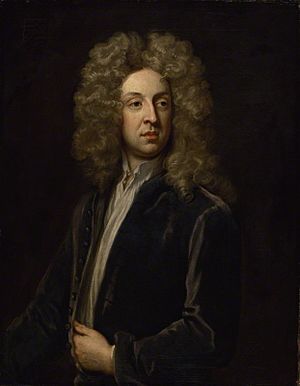Arthur Maynwaring facts for kids
Arthur Maynwaring (born July 9, 1668 – died November 13, 1712) was an important English official and politician from Ightfield, Shropshire. He served in the English and British Parliament from 1706 to 1712. He was also a talented journalist and a political writer who shared his strong opinions.
Contents
Growing Up and Early Life
Arthur Maynwaring was born in Ightfield. His father was Charles Maynwaring, and his mother was Katherine Cholmondeley. His grandfather was Sir Arthur Mainwaring.
He went to Shrewsbury School and then studied at Christ Church, Oxford, when he was 15. Later, in 1687, he began studying law at the Inner Temple.
At first, Arthur Maynwaring supported King James II. This was during a time called the Glorious Revolution, when King James II lost his throne. For many years, Arthur lived with his uncle, Francis Cholmondeley, who also supported King James II.
Arthur wrote an article that supported King James II. This article caught the attention of his relatives who supported the new government, like Lord Cholmondeley and the Duke of Somerset. They introduced him to powerful Whig leaders, including Lord Somers. After meeting these people, Arthur Maynwaring changed his political views and became a Whig.
Arthur Maynwaring's Political Career
When his father passed away around 1693, Arthur inherited some land. He decided to stop studying law and focus on politics and social life. After a peace treaty with France in 1697, he visited Paris.
He became a member of the Kit-Cat Club, which was a famous club for Whig politicians and writers. He was given a job as a commissioner of customs. In 1705, he was appointed auditor of imprests, which was an important financial role.
Arthur Maynwaring was a close friend and even a secretary to Sarah Churchill, Duchess of Marlborough, who was a very influential woman at the time.
In 1706, Arthur Maynwaring was elected as a Member of Parliament for Preston. He was re-elected for Preston in 1708. He supported new laws to allow people from Germany, called Palatines, to become English citizens. He also strongly supported the prosecution of Henry Sacheverell, a preacher who caused a lot of controversy.
Later, in 1710, he was elected as an MP for West Looe. Sadly, his health began to fail because he had a lung illness called consumption (now known as tuberculosis). Even though he was ill, he continued his work as a journalist and kept up with his duties as an auditor.
His Writings and Journalism
Arthur Maynwaring was a talented writer. One of his first works was Tarquin and Tullia. This was a strong satire that criticized King William III and Queen Mary II.
He also wrote The King of Hearts, which made fun of Henry Booth, 1st Earl of Warrington. These verses were published without his name, but they sold very well. Some people even thought the famous writer John Dryden had written them!
Arthur Maynwaring also wrote many introductions for plays starring the actress Anne Oldfield.
He fiercely attacked Henry Sacheverell and his supporters in his Letters to a Friend in North Britain. He also wrote Hannibal and Hanno, which defended the Duke of Marlborough.
He was involved in a Whig newspaper called the Whig Examiner. Later, he started his own paper called The Medley in 1710. For about ten months, The Medley was mostly Arthur Maynwaring's own work. He used it to criticize the rival Tory newspaper, the Examiner.
By 1711, the Tory party was very strong. The Examiner stopped publishing, and soon after, the last Medley was printed. Arthur Maynwaring continued to write, including an attack on French policy. In 1712, he was working on a history of a famous battle called Blenheim.
Death and Legacy
Arthur Maynwaring passed away on November 14, 1712. He never married, but he had a son named Arthur with Anne Oldfield.
He left his property to be shared equally between Anne Oldfield, his sister (who had cared for him during his illness), and his son Arthur. The money for his son was meant to be used for his education.
After his death, a Tory newspaper attacked his character. However, Robert Walpole, another important politician, defended him.
See Also


